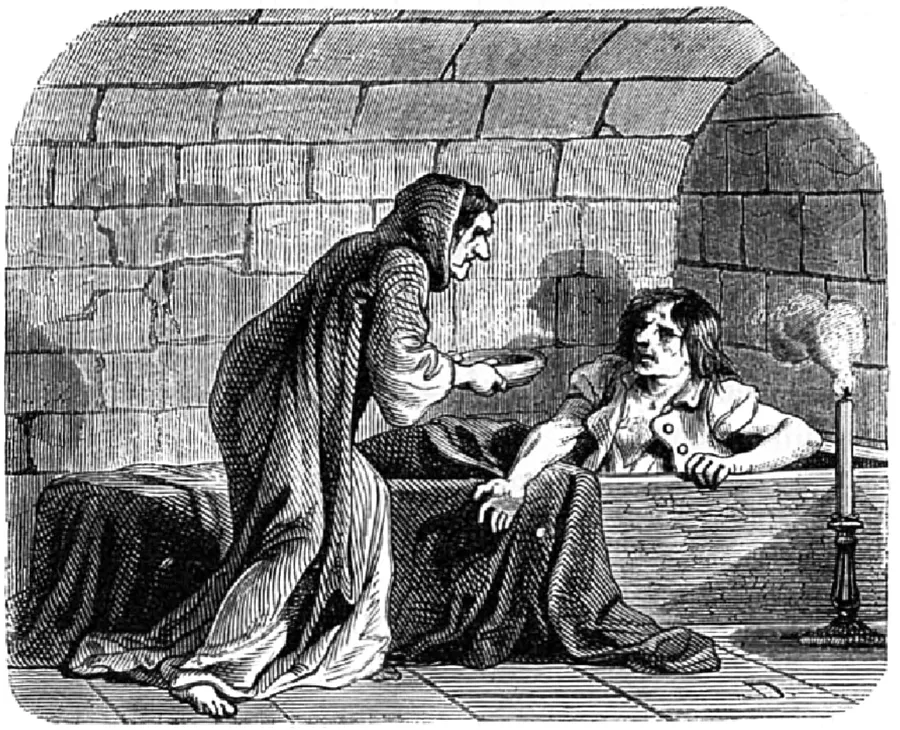The Drunkard and his Wife
There are no animals in this fable, only two humans.
One is a fallen man, a drunkard.
The other one is his wife, who desperately tries to save him using some trick.

L'Ivrogne et sa Femme
Chacun a son défaut,
où toujours il revient :
Honte ni peur n’y remédie.
Sur ce propos d’un conte il me souvient :
Je ne dis rien que je n’appuie
De quelque exemple. — Un suppôt de Bacchus
Altérait sa santé, son esprit et sa bourse :
Telles gens n’ont pas fait la moitié
de leur course
Qu’ils sont au bout de leurs écus.
Un jour que celui-ci, plein du jus de la treille,
Avait laissé ses sens au fond d’une bouteille,
Sa femme l’enferma dans un certain tombeau.
Là, les vapeurs du vin nouveau
Cuvèrent à loisir. À son réveil il treuve
L’attirail de la mort à l’entour de son corps,
Un luminaire, un drap des morts.
Oh ! dit-il, qu’est ceci ?
Ma femme est-elle veuve ?
Là-dessus, son épouse, en habit d’Alecton1,
Masquée, et de sa voix contrefaisant le ton,
Vient au prétendu mort, approche de sa bière,
Lui présente un chaudeau2 propre pour Lucifer.
L’époux alors ne doute en aucune manière
Qu’il ne soit citoyen d’enfer.
Quelle personne es-tu ? dit-il à ce fantôme.
La cellérière du royaume
De Satan, reprit-elle ; et je porte à manger
À ceux qu’enclôt la tombe noire.
Le mari repart, sans songer :
Tu ne leur portes point à boire ?
1: L'une des Furies.
2: Bouillon chaud.
The Drunkard and his Wife
Everyone has his defect,
to which he always returns:
Shame or fear does not remedy it.
On this subject, I remember a tale:
I don't say anything that I don't support
With some example. — A henchman of Bacchus
Impaired his health, mind, and purse:
Such people have not done half
of their life
That they are at the end of their money.
One day that this one, full of the juice of the vine,
Had left his senses at the bottom of a bottle,
His wife locked him in a certain tomb.
There, with the vapors of the new wine
He slept at leisure. When he wakes up he finds
The paraphernalia of death around his body,
A lamp, a sheet of the dead.
Oh ! said he, what is this?
Is my wife a widow?
Thereupon his wife, in the habit of Alecton[1],
Masked, with her voice counterfeiting the tone,
Comes to the fake dead, approaches his coffin,
Presents him with Luciferian hot broth.
The spouse then does not doubt in any way
That he is a citizen of hell.
What person are you? he said to this ghost.
I am the supply keeper of the Kingdom
Of Satan, she replied; and I bring food
To those enclosed in the black tomb.
The husband replies, without thinking:
You don't bring them a drink?
1: One of the Furies.
First Fable: The Circada and the Ant
Previous fable: The Fox and the Billy Goat
Next fable: The Wolf and the Stork
Portrait of a fallen man
The man is completely reduced to his vice: he is nothing but his addiction.
Wine is his God
Alcoholism is not the theme of the fable, it is only an example. It is vice in general that La Fontaine wants to denounce.
This man has given up his humanity, only his flaw is present.
He is passive. The only times he comes into action are brought on by his wife or wine. The only time he does something, he does it "without thinking".
This fable is based on the fatality of vice, the inevitable outcome. Vice is a habit that takes over everything else.
The story of a failure
The wife uses a whole theatrical show, to try to help her husband (out of love? on principle? for the money?)
She wants to dramatize her husband's situation to try to make him react.
However, she fails in her tentative to reform her husband.
We should not be surprised, as has been predicted in the first two verses:
Everyone has his defect, to which he always returns:
Shame or fear does not remedy it.
Vice avoidance and treatment without illusions
We should try to avoid any damaging vice. Easier said than done. The first step is to recognize that we have a problem.
At the same time, we should not think that it is easy to reform a friend or a parent that has such a problem. We need patience and continuous help. Then, we may see some progress. But this is not the end: the person will need help all of their life,